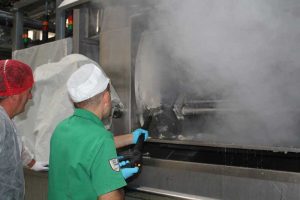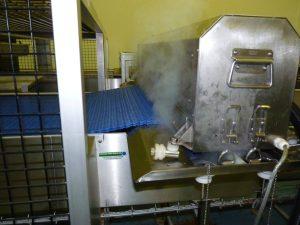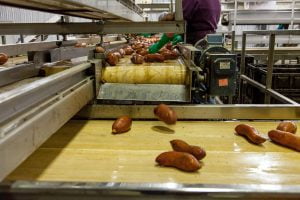Bakery conveyor belts are an essential component of the bakery industry. These belts are used to transport bakery products such as bread, pastries, and cakes throughout the production process. They are designed to be durable and efficient, allowing for the smooth and continuous movement of products from one stage to another.
The importance of conveyor belts in the bakery industry cannot be overstated. They play a crucial role in ensuring the efficiency and productivity of bakery operations. Without conveyor belts, the process of moving bakery products from one area to another would be slow and labor-intensive. Conveyor belts allow for the automation of this process, saving time and reducing the need for manual labor.
Importance of Cleanliness in Bakery Conveyor Belts
Cleanliness is of utmost importance when it comes to bakery conveyor belts. Contamination in bakery products can have serious consequences, both for consumers and for bakery businesses. Contaminated products can lead to foodborne illnesses, which can result in health issues for consumers and damage to a bakery’s reputation.
Dirty conveyor belts can have a significant impact on product quality and safety. Bacteria, mold, and other contaminants can accumulate on the surface of the belts if they are not cleaned regularly. These contaminants can then transfer onto bakery products as they move along the conveyor belt, leading to contamination.
Industry Standards for Conveyor Belt Cleanliness
To ensure the cleanliness of bakery conveyor belts, there are industry standards that businesses must adhere to. These standards outline the requirements for maintaining clean conveyor belts and help ensure that bakery products are safe for consumption.
The Food Safety Modernization Act (FSMA) is a key piece of legislation that sets standards for food safety in the United States. Under this act, bakeries are required to implement preventive controls to minimize the risk of contamination in their production processes. This includes regular cleaning and maintenance of conveyor belts.
Best Practices for Conveyor Belt Cleaning
To effectively clean bakery conveyor belts, there are several steps that businesses should follow. Firstly, it is important to remove any loose debris or food particles from the belts. This can be done using a brush or vacuum cleaner. Once the loose debris has been removed, the belts should be washed with a suitable cleaning solution and rinsed thoroughly.
The frequency of conveyor belt cleaning will depend on the volume of bakery products being produced and the level of contamination. However, it is generally recommended to clean conveyor belts at least once a day to ensure optimal cleanliness.
Choosing the Right Cleaning Products for Conveyor Belts
When choosing cleaning products for bakery conveyor belts, there are several factors to consider. Firstly, it is important to select a cleaning solution that is safe for use on food contact surfaces. The cleaning solution should be approved by regulatory bodies and should not leave any residue or odour on the belts.
There are different types of cleaning products available for conveyor belts, including detergents, sanitizers, and degreasers. Detergents are used to remove dirt and grease from the belts, while sanitizers are used to kill bacteria and other microorganisms. Degreasers are used to remove heavy grease and oil stains.
Conveyor Belt Maintenance Tips for Optimal Performance

Regular maintenance is essential for ensuring the optimal performance of bakery conveyor belts. This includes inspecting the belts for any signs of wear or damage and replacing them if necessary. It is also important to lubricate the belts regularly to prevent friction and ensure smooth movement.
In addition to regular maintenance, there are several tips that can help prolong the lifespan of conveyor belts. Firstly, it is important to avoid overloading the belts with heavy bakery products, as this can cause them to wear out more quickly. Secondly, it is important to keep the belts clean and free from debris, as this can cause them to become clogged and affect their performance.
Common Conveyor Belt Cleaning Mistakes to Avoid
There are several common mistakes that businesses make when it comes to cleaning bakery conveyor belts. One common mistake is using the wrong cleaning products or using them incorrectly. This can lead to ineffective cleaning and may even cause damage to the belts.
Another common mistake is not cleaning the belts frequently enough. Regular cleaning is essential for maintaining the cleanliness of conveyor belts and preventing contamination. Failure to clean the belts regularly can result in the buildup of bacteria and other contaminants, which can then transfer onto bakery products.
Training Employees on Proper Conveyor Belt Cleaning Techniques
Proper training of employees is crucial for ensuring that bakery conveyor belts are cleaned effectively. Employees should be trained on the correct cleaning techniques and procedures, as well as the importance of maintaining cleanliness in the bakery.
Training should include instruction on how to use cleaning products correctly, how to identify signs of contamination, and how to properly clean and maintain conveyor belts. It is also important to provide ongoing training and refresher courses to ensure that employees stay up-to-date with best practices.
Ensuring Food Safety with Clean Conveyor Belts
Clean conveyor belts are essential for ensuring food safety in the bakery industry. Contaminated bakery products can have serious health consequences for consumers, and can also result in legal issues and damage to a bakery’s reputation.
By maintaining clean conveyor belts, bakeries can minimize the risk of contamination and ensure that their products are safe for consumption. This not only protects consumers but also helps to build trust and loyalty among customers.
The Benefits of Clean Bakery Conveyor Belts
In conclusion, clean bakery conveyor belts are crucial for ensuring the efficiency, productivity, and safety of bakery operations. Contamination in bakery products can have serious consequences, both for consumers and for bakery businesses. By adhering to industry standards for conveyor belt cleanliness and implementing best practices for cleaning and maintenance, bakeries can minimize the risk of contamination and ensure the safety of their products.
Clean conveyor belts also have a positive impact on customer satisfaction. Customers are more likely to trust and continue to purchase bakery products from businesses that prioritize cleanliness and food safety. Therefore, investing in the cleanliness of bakery conveyor belts is not only essential for compliance with industry standards but also for the long-term success and reputation of bakery businesses.
If you’re in the bakery industry and looking for effective ways to clean your conveyor belts, you may find this article on essential tools for your business helpful. It provides a comprehensive list of industrial cleaning equipment that can be used to keep your conveyor belts spotless in the food industry. From conveyor belt cleaners to automated dry steam cleaning systems, this article covers all the necessary tools for optimal performance and hygiene in your bakery operations.
FAQs
What is a bakery industry conveyor belt cleaning?
Bakery industry conveyor belt cleaning is the process of removing dirt, debris, and other contaminants from conveyor belts used in the bakery industry.
Why is conveyor belt cleaning important in the bakery industry?
Conveyor belt cleaning is important in the bakery industry to maintain food safety and hygiene standards. Contaminants on conveyor belts can lead to foodborne illnesses and product recalls.
What are the common methods used for conveyor belt cleaning in the bakery industry?
Common methods used for conveyor belt cleaning in the bakery industry include dry cleaning, wet cleaning, and steam cleaning.
What are the benefits of dry cleaning for conveyor belts in the bakery industry?
Dry cleaning is a quick and efficient method for removing dry debris from conveyor belts in the bakery industry. It is also a cost-effective method that does not require the use of water or chemicals.
What are the benefits of wet cleaning for conveyor belts in the bakery industry?
Wet cleaning is a more thorough method for removing dirt and debris from conveyor belts in the bakery industry. It is also effective at removing grease and oil. However, it requires the use of water and cleaning chemicals.
What are the benefits of steam cleaning for conveyor belts in the bakery industry?
Steam cleaning is an environmentally friendly method for cleaning conveyor belts in the bakery industry. It uses only water and heat to remove dirt and debris, and it does not require the use of chemicals.
What are the best practices for conveyor belt cleaning in the bakery industry?
Best practices for conveyor belt cleaning in the bakery industry include regular cleaning schedules, proper use of cleaning equipment and chemicals, and training for employees on food safety and hygiene.










